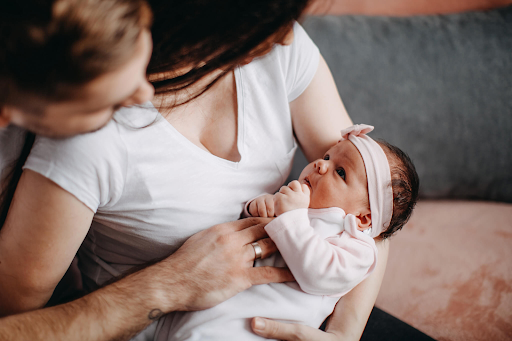IS THE BABY CONNECTED WITH THE SURROGATE?

We’re here to answer frequently asked questions about genetics and surrogacy, which can be divided into four categories:
Genetic relationship questions
Concerns about blood
Concerns about DNA inheritance
Concerns about the baby’s physical appearance
You can always contact a surrogacy professional to learn everything there is to know about surrogacy. Continue reading this guide to get answers to frequently asked surrogacy questions.
1. GENETIC RELATIONSHIP QUESTIONS
“Do surrogate mothers have anything to do with the baby?”
“Can a surrogate mother be considered a biological mother?”
“Does the surrogate mother have genetic ties to the child?”
The most frequently asked question about the surrogacy process is, “Is the baby connected to the surrogate?” The answer depends on the type of surrogacy in question.
All you need to know is the following: It all comes down to who is using the egg, not the uterus.
In traditional surrogacy, the answer is “yes.” (which is rare nowadays because of the legal and emotional complexities involved). The biological mother of the baby brought in for the purpose parents is a traditional alternative. She creates the embryo using her egg and either the donor or intended sperm of the father which means she is genetically linked to the baby. As a result, conventional surrogacy is often more legally similar to adoption.
Gestational surrogacy is unique. The answer is “no” to gestational surrogacy, the preferred and more popular modern surrogacy method. Gestational surrogates have no biological relationship to the babies they carry. IVF is used to develop an embryo from egg and sperm donated by donors or intended parents, which are then transferred into the uterus of a gestational surrogate to give birth. Because the baby is not biologically theirs, gestational surrogates commonly refer to the experience as “extreme babysitting.”
Above all, remember that the child born through surrogacy is always genetically related to the person whose egg and sperm were used to form the embryo.
2. Concerns about blood
“Do surrogate mothers share the baby’s blood?”
“Does a surrogate need to have the same blood type as the child she is carrying?”
Some people ask this question literally, while others ask about “blood” in the context of family relationships. Again, only conventional surrogates are biologically connected to the babies they carry, making them “blood” relatives. Gestational surrogates to whom you (as an intended parent) are not related by “blood” to the babies they carry — they have no biological link to your child.
If the surrogates are sharing blood with the child in the womb, the answer is yes. During pregnancy, the pregnant woman’s blood, oxygen, and nutrients are delivered to the baby through the umbilical cord. The surrogate’s blood type is irrelevant; many genetic mothers and their children have different blood types.
However, before the surrogacy procedure begins, blood tests and strict medical tests are necessary to check for infectious diseases, because those problems can be transferred from the carrier to the fetus during pregnancy.
3. Concerns about DNA inheritance
“Does a surrogate mother’s DNA pass on to the child?”
“Does a surrogate mother share the baby’s DNA?”
“Do surrogates donate DNA?”
Many individuals are confused about how genes (made up of DNA sequences) are inherited and how surrogacy can play a role in this. First, some genetics fundamentals: To create an embryo, you need both male genetic material (sperm that holds that person’s DNA) and female genetic material (an egg that contains that person’s DNA).
Regardless of which uterus the embryo is conceived in, the genetic material will only come from the two people who formed the embryo. In genetic inheritance, the egg and sperm are important. However, if you kiss someone, they will not immediately receive your DNA and become connected to you. Similarly, donating blood does not make the recipient your relative.
Even if an embryo is implanted in another woman’s womb, it will not “get” that woman’s DNA.
4. Concerns about the baby’s physical appearance
“Can a child be like a surrogate mother?”
“Does the child resemble the surrogate mother?”
“Can newborns be like their surrogate?”
“Does the surrogacy baby resemble its parents?”
If a baby born through surrogacy looks like anyone, it’s the two people who contributed the egg and sperm.
So, if the surrogate is typical (meaning she gave the egg and carried the baby), the baby will look like her. However, if the surrogate is a gestational surrogate (meaning the embryo was created using another woman’s egg), the baby will not look like the surrogate.
If the intended parents donate their eggs and sperm, chances are the child will look like them. However, it is not guaranteed that a child will be happy with their genetic parents.
If the embryo is created using an egg donor and a sperm donor, the newborn will look like those two people.
Egg and sperm donors, not the uterus that holds the baby, affect the baby’s appearance.
FINALLY, WHO ARE THE CHILD’S REAL PARENTS?
Who are the “real” parents of a child born through surrogacy? Biologically, the answer is that the two individuals provided the egg and sperm.
However, some intended parents need the help of egg and sperm donors to conceive their children, which means one or both. This use of donor gametes makes no difference to family bonds.
Adoption shows that a child’s “real” parents are the ones who read bedtime stories, give Band-Aids and hugs, and show up to every soccer game. Surrogacy and other “non-traditional” methods of family formation are no exception in this regard.





